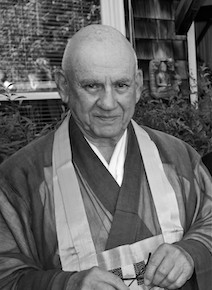
Dharma Talk on
|
Here is the place and here the way unfolds. The boundary of realization is not distinct, for the realization comes forth simultaneously with the mastery of Buddha Dharma. Do not suppose that what you realize becomes your knowledge and is grasped by your consciousness. Although actualized immediately, the inconceivable may not be apparent. Its appearance is beyond your knowledge. Even though we don't know everything and don't even realize what we do know, our practice is complete when we sit with a pure and non-discriminating mind. We may not even know the complete meaning of our practice. Dogen then gives an example, Zen master Baoche of Mount Mayu was fanning himself. A monk approached and said, "Master, the nature of wind is permanent, and there is no place it does not reach. Why then do you fan yourself? "Wind" here means Buddha nature. What the monk is saying is that if Buddha nature is all-pervasive and there is no place where it is not, why are you fanning yourself? It is a good question. This was Dogen's question when, as a young monk, he went to China. Dogen said to himself, "If everyone has Buddha nature, if Buddha nature pervades the universe, why do we have to practice?" Why do we have to exert effort to manifest it? So, he went to China with this question. Baoche replied, "‘Although you understand that the nature of wind is permanent, you do not understand the meaning of its reaching everywhere.' ‘What is the meaning of its reaching everywhere?' the monk asked again. The master just kept fanning himself. The monk bowed deeply." What is the nature of "permanence?" The master's fanning means that even though Buddha nature pervades the universe, in order to experience it we have to activate enlightenment or realization through practice. Even though the nature of everything is Buddha, and Buddha nature is the essence of all existence, in order to realize it, we have to be a vessel for it. For example, although you have a car parked in front of your house, it is not completely functional as a car until you turn the key in the ignition and step on the gas. Dogen's understanding is that practice and realization are not two. Practice is not apart from enlightenment, and enlightenment is not separate from practice. That is why he says some may realize it and some may not. Even though realization is intrinsic, it isn't necessarily experienced as realization. But if you practice, realization is there. Then he continues, "The monk bowed deeply. The actualization of the BuddhaDharma, the vital path of its correct transmission is like this. If you say that you do not need to fan yourself because the nature of wind is permanent, and you're going to have wind without fanning, you will understand neither permanence, nor the nature of wind." In other words, you won't understand Buddha nature, and you will also not understand your own activity, even though we think we understand our activity. "The nature of wind is permanent. Because of that, the wind of the Buddha's house brings forth the gold of the earth, and makes fragrant the cream of the long river." There are many important points here, but I think the main point is how to bring life to life in each moment, and in this way, to extend zazen into our daily life by finding our dharma position on every moment within what Suzuki Roshi called Big Mind. It means no self-centered activity. Just basically not to be selfish. That is very simple. As soon as we revert to self-centered activity we lose our way and our place. But as long as we continue this non-self-centered activity and simply practice for the sake of practice, the way and the place will open up wherever we are. There is no special thing that we have to do, but everything we do has a special quality. Sweeping the floor, washing the dishes, just ordinary activity becomes the Way. © 2005 Sojun Mel Weitsman |